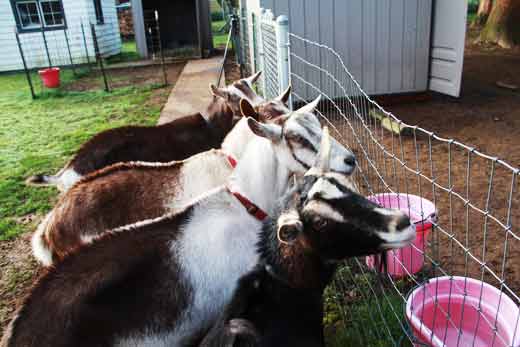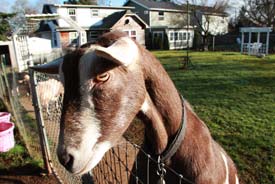Ed Arcement and his wife Nancy love cheese. Indeed, their mutual enthusiasm for this processed food is why, in 2005, they chose to attend a national goat show in Spokane, Washington. They found themselves suddenly bidding on a particular goat, and as Ed explains during the interview, the bidding kept going up, and Nancy kept matching it. Before they knew it, they had won the bid at (about) $1100. “Variety” their first goat, was theirs!
Abita Springs Farm where the Arcement’s live, is located in the Cully neighborhood of Portland, Oregon, and is situated on a ½ acre lot, ample size to own a small herd of dairy goats. Within the city limits, the city requires herd size to be kept at a 9 goat limit, or lower.
Their current lineup of goats includes Wednesday, the offspring from their first goat (Variety), who had died suddenly in the prime of life. Oreo and Lilly are Wednesday’s offspring, Wednesday having been hooked up with a “fine buck”, and Bonnie, who as Oreo’s baby, is the youngest addition to the family. Her non-biological father (Ed Arcement) plans to have her bred this year (2013), and expects Bonnie will herself become a great milk producer like the others.
The Arcement’s also want others to experience their goats, to help foster the connection of where their food comes from, and enjoy the simple pleasures of being around these benevolent creatures. On an annual basis, the Arcement’s offer tours of their farm to kindergarten and 1st grade students, and have even brought in residents of a neighborhood senior retirement center to visit.
Five years ago, while a group of elementary grade students were visiting, Nancy turned to her husband and told him one of their goats, Whistle “is going into labor“. Ed responded, “No, she’s not,” to which Nancy replied, well, “there’s babies coming out” of her!
The young children stood along the fence, and watched as the Arcement’s pulled two healthy baby goats out of Whistle, and the students were allowed to help tie the umbilical cords, and dry off the wet babies. The Arcement’s still have the class pictures that the kids drew of their visit, many of them depicting the birth of the two goats.
Having goats within the city limits also carries with it some additional risks that requires special vigilance. A few years back, the Arcement’s goats were attacked by a stray German Shephard that got inside the fence, and within minutes, seriously wounded 4 of their goats, one of whom subsequently died. As a result, they lock their goats into three separate pens at night, and have a 24/7 baby monitor that alerts them to any problems with intruders.
Regarding, living day in, and day out with his goats, “If I would have known 40 years ago what I know now, I would have done it 40 years ago. It’s something that you find out that you really love doing it, and you just want to continue forever,” says Ed Arcement.

Most of the videos featured on Cooking Up a Story were produced, filmed, and edited by Rebecca Gerendasy. Fred Gerendasy contributed as a writer to many of the posts and occasionally as the interviewer. Visit Rebecca Gerendasy Clay – Art and Fred Gerendasy Photography to see their current work.


